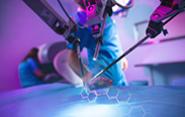Unique Yale Master's Program Will Combine Surgery and Engineering

In medicine, one size does not fit all. This is especially true for orthopaedic surgery, where medical devices and surgical approaches designed specifically for a patient's anatomy are linked to lower costs and better quality of life.
Now, Yale School of Medicine and Yale School of Engineering & Applied Science have launched a master's program that melds personalized patient care with engineering. The new Master of Science in Personalized Medicine & Applied Engineering will train the next generation of engineers, computer scientists, and medical professionals alike in using new technologies in 3-dimensional medicine and imaging with the goal of improving patient outcomes. The one-year advanced degree program, which is the first of its kind, will begin this summer.
"The medical profession has always relied on science, engineering, and technology as the basis for the practice," says Vincent Wilczynski, PhD, deputy dean of Yale School of Engineering & Applied Science and James S. Tyler Director of the Center for Engineering Innovation & Design. "The rate of change in engineering and medical technology now calls for engineering and technology specialists to partner with medical specialists to deliver forms of technology-dependent care."
Orthopaedics and engineering: closely related
Orthopaedic surgery requires a close partnership among surgeons and engineers. While surgeons have the expertise in performing operations, engineers possess important technological skills in 3D planning. The idea for the new program was born when Lisa Lattanza, MD, chair and professor of orthopaedics & rehabilitation, who has taken part in more than 250 cases involving 3D technology, realized along with an engineering colleague that there was a lack of specialized training available for engineers and physicians.
"What became apparent is that there is a wide, wide variation in the skillsets of engineers and surgeon/physicians," she says. "That's how this all came about—we started to look into whether a program like this existed and it didn't. So, we began designing something that doesn't exist anywhere else in order to facilitate the use of advanced 3D technology for patient/surgical care."
What master's students will learn
Lattanza teamed up with Daniel Wiznia, MD, assistant professor of orthopaedics and rehabilitation and assistant professor of mechanical engineering & materials science; and Steven Tommasini, PhD, research scientist in orthopaedics; as well as Wilczynski. Together, they designed the new master's program.
"It's an amazing thing," says Wiznia. "There is no other integrated training program that teaches engineers and medical students how to take imaging and create custom treatments, either with robotics, XR, or 3D printing from a medical perspective."
The program will kick off with an eight-week clinical immersion program, where students will shadow clinical mentors from various departments and be trained to identify needs for either new devices or improvements on existing resources. This will be followed by two semesters of coursework, where students will take classes on subjects including 3D modeling and printing, personalized medicine software and medical device design. They will also take on a research thesis, in which they can either stick with their summer mentors or choose a new mentor. And the program will continue to grow, says Tommasini, alongside the emerging technology.
"As the technology advances, we will be able to adapt and bring newer things into the curriculum," he says. "As the VR and AR worlds get more sophisticated, so will the curriculum."
Enhancing patient care and career opportunities
The goal of the program is to open doors for graduates to be hired directly by hospitals, healthcare systems, and medical device companies for positions in 3D medicine and imaging as well as train the next generation of physicians to use and develop these technologies. With the skills from their coursework and hands-on experience, they will have the tools they need to hit the ground running into their careers.
"The wave of the future in medicine is to personalize patient care as much as possible," says Lattanza. "Now is the time for us to really latch on to the technology that's out there and bring it to the next dimension."
by Isabella Backman, Yale School of Medicine

